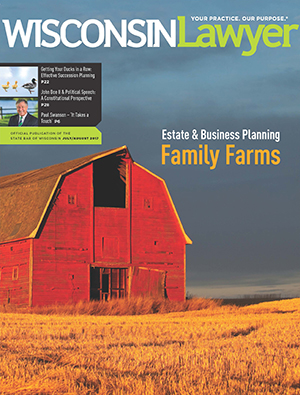 July 26, 2017 – In many farmers’ minds, a farm is only a “family” farm while it’s owned and operated by the farmer or one of his or her relatives. Thus, effective estate planning for many rural Wisconsin residents is a matter not only of the typical goal of treating all heirs fairly but also the goal of ensuring that the family’s assets can continue to be used for agricultural purposes by future generations within the family.
July 26, 2017 – In many farmers’ minds, a farm is only a “family” farm while it’s owned and operated by the farmer or one of his or her relatives. Thus, effective estate planning for many rural Wisconsin residents is a matter not only of the typical goal of treating all heirs fairly but also the goal of ensuring that the family’s assets can continue to be used for agricultural purposes by future generations within the family.
In “Estate & Business Planning for Family Farms,” Shayna W. Borakove identifies types of farm-specific information a lawyer should gather from the client at the outset of the engagement, examines the concerns and goals shared by many farmers with an on-farm heir and off-farm heirs, outlines ethical considerations in identifying the client, and lays out a farm-client case study with an analysis including a potential planning strategy. The focus here is on representing family farm clients, but the content also applies to clients with family-owned non-farm businesses or diverse real estate holdings.
The print July/August Wisconsin Lawyer™ is now hitting mailboxes. But why wait? Read about estate and business planning for family farms, succession planning for law firms, and other timely content. Here’s an overview of what you’ll find in the issue.
Preserving Your Law Firm When You’re No Longer Around
Face it. No one lives forever. American law firms and lawyers are aging rapidly. By 2020, more than half the legal work force will be over age 55. And there will be a sharp decrease in the number of lawyers between the ages of 35 and 55. Despite these demographics, only 26 percent of law firms have formal succession plans in place. Worse, more than 60 percent of law firms rely on an informal or ad hoc approach to succession planning.
In “Getting Your Ducks in a Row: Three Steps to Effective Succession Plans,” Michael F. Moore explains that serving clients well includes planning for what will happen when you’re no longer around to provide that good service. He provides a footprint for preserving and transmitting knowledge, maintaining existing and creating new client relationships and sources of revenue, developing leaders, valuing the law practice, and more.
Distinguishing Express Advocacy and Issue Advocacy
In State ex rel. Two Unnamed Petitioners v. Peterson, a majority of the Wisconsin Supreme Court ruled that Wis. Stat. chapter 11 (campaign financing) can never constitutionally regulate issue advocacy. Denial of certiorari of the court’s 2015 decision in the case culminated a four-year legal battle following a John Doe investigation into alleged campaign finance violations by individuals and entities related to the Gov. Scott Walker recall election. In “John Doe II and Political Speech: A Constitutional Perspective,” Eric M. McLeod and Joseph S. Diedrich discuss the history of the express advocacy-issue advocacy distinction, the core of the John Doe II court’s decision.
Other Columns: New State Bar President and Executive Director, Representing Injured Federal Employees, Invoicing for No-charge Items, Gamer Products for Legal Productivity
Profile: In “Paul Swanson: ‘It Takes a Touch’,” learn what makes the new State Bar president tick and why he encourages more lawyers to participate in the organization.
Your State Bar: In “A New Beginning Starts with New Shoes,” Larry Martin says you can’t fill someone else’s shoes, so he’s bringing his own vision and enthusiasm to the executive director role.
As I See It: In “Scales of Injustice: Worker’s Comp for Federal Employees,” Michael McCready, founder of McCready Law, believes more injured federal employees would be represented by lawyers if the federal worker’s comp system did not contain barriers to retaining and paying counsel.
Marketing: In “Why Lawyers Should Say No to ‘No Charge’ Invoice Items,” Carolyn Elefant says if you believe clients think “Gee, what a nice lawyer,” when you no-charge for invoiced items, you should think again.
Managing Risk: How to resolve a potential error might not be obvious. But in “When Mistakes Occur, Honesty is the Best (Noninsurance) Policy,” Tom Watson says covering up the mistake is 100 percent wrong.
On Balance: In “Job Crafting: Reshape Your Practice for a Better Life Fit,” Paula Davis-Laack writes that if work is causing you a lot of stress, consider remaking your job to make it a better match.
Technology: In “Using Non-law Products for Legal Productivity,” Tison Rhine identifies two gamer products that could be great for legal productivity.
Ethics: In “Technical Competence Requires Knowing the Fundamentals,” Dean Dietrich explains lawyers need not have computer science or engineering expertise, but they do need to understand technology and its benefits and risks.
Final Thought: Even phone-phobic lawyers can save time and hassle just by having a conversation instead of exchanging emails. So Brandon Evans advises, “Pick Up the Damn Phone.”
Check out the July/August Wisconsin Lawyer.
Links to Other Content
